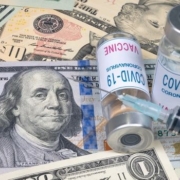Two life sciences powerhouses are coming together to develop an off-the-shelf beta cell replacement therapy for insulin-dependent diabetes patients, which they hope will become a functional cure for both types of the disease.
Eli Lilly scored another win against diabetes as the company’s once-weekly dual glucose-dependent insulinotropic polypeptide (GIP) and glucagon-like peptide-1 (GLP-1) receptor agonist tirzepatide won approval under Priority Review from the U.S. Food and Drug Administration.
Like COVID, Life Science Industry Finances Gain and Lose Strength
Antivirals, BioNTech, Biopharma, Blockbusters, Business, Coronavirus Disease (COVID-19) Pandemic, COVID-19 Antibodies, Diabetes, Eli Lilly, Forecasts, GlaxoSmithKline, Initial Public Offering (IPO), Investors Business Daily, M&A, Moderna, Multiple Sclerosis, Paxlovid, Pfizer, Plasma, Quarterly results, Shingles, Stock Markets, Stocks, Teva, Therapeutics, Vir BiotechnologyAlthough 2020 was a tough year for the biopharma industry — and most other industries as well — it appeared to rebound significantly in mid-2021. However, biotech stocks are generally getting hammered during 2022, although to be fair, the entire stock market is down.
Life expectancy in the United States fell by nearly two years in 2020 to about 77 years amid the COVID-19 pandemic, the sharpest drop compared to 21 other high-income countries, according to a global study.
More than 100,000 Americans died from diabetes in 2021, marking the second consecutive year for that grim milestone and spurring a call for a federal mobilization similar to the fight against HIV/AIDS.
The U.S. health regulator issued a warning letter to Medtronic Plc highlighting certain concerns related to medical device quality management at its diabetes business, the company said on December 15.
The New York Times profiled the success story of a type 1 diabetes patient who was dosed with Vertex Pharmaceuticals’ experimental fully differentiated pancreatic islet cell replacement therapy, and after an infusion of VX-880, he began to produce his own insulin.
The number of young people with the most prevalent form of diabetes nearly doubled in the United States from 2001 to 2017, according to a study published on Aug. 24.
Walmart will start selling private-label analog insulin at a deep discount to branded insulin vials and pens, as the company seeks to drive growth at its healthcare business.
The Covid-19 vaccine developed by Pfizer and BioNTech is effective at preventing symptomatic and severe disease in people with some chronic illnesses, like diabetes and heart disease, the biggest real-world study showed on April 22.










